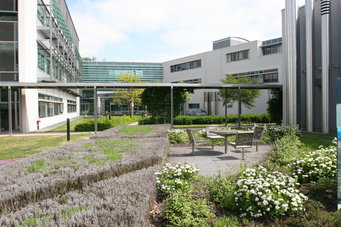The Graduate Center − more than the sum of its parts
Our joint research effort into quantum materials
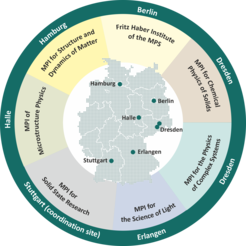
All Max Planck Institutes participating in the Graduate Center are world-leading institutions in their respective fields, and they operate highly attractive Ph.D. programs in cooperation with universities both in Germany and abroad. Within the Graduate Center for Quantum Materials, these institutes will join forces and further enhance their strong collaboration in research and training of outstanding young scientists. We offer our students a truly unique research environment with access to a large number of world-class research facilities, as well as a newly designed curriculum covering the frontiers of research on quantum materials.
Here are short descriptions of the institutes participating in our Center. You can find more detailed information about their research on their respective websites.
Max Planck Institute for Chemical Physics of Solids
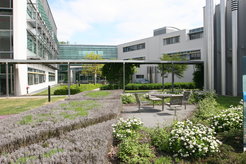
The scientific activities at the Max Planck Institute for Chemical Physics of Solids (MPI CPfS) in Dresden focus on world-leading fundamental research on the properties of materials, working at the boundaries of solid state chemistry and condensed matter physics. In detail, the scope of our activities encompasses all aspects of solid-state research from material synthesis over fundamental characterization of novel materials to the design of highly sophisticated approaches in order to study intriguing phenomena both theoretically and experimentally. Across the different departments of the institute, materials of interest include new classes of intermetallic compounds, Heusler materials and materials including transition metals or rare-earth elements. These and other materials allow us to study phenomena based on, for example, their topological properties or strong electronic correlations either in-house or at user facilities all across the world.
Max Planck Institute of Microstructure Physics
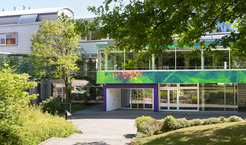
The Max Planck Institute of Microstructure Physics has substantial experimental and theoretical research programs that are focused on novel materials with useful functionalities. Of particular interest are spintronic materials and devices, neuromorphic devices and systems, nano-photonics, topological metals and insulators. The Institute is involved in extensive collaborative research projects, both national and international, with partners in China, India, Europe including Israel, and the USA. Besides, the institute has an extensive infrastructure that includes a state-of-the-art model shop, electronics workshop, a supercomputer, and a clean-room, as well as a wide range of modern experimental facilities.
Max Planck Institute for Solid State Research
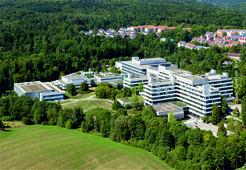
The Max Planck Institute for Solid State Research comprises eight research departments with scientific focus on quantum materials, nanoscience, and materials for sustainable energy. Close interaction and cooperation between physicists and chemists, experimentalists and theorists at all levels is an essential element of the institute culture. Major research facilities include state-of-the-art materials synthesis and nanostructuring laboratories, a unique laboratory building with seismically, acoustically, and electromagnetically environments for high-precision experiments, and several synchrotron and neutron beamlines. The Institute collaborates intensely with many research groups worldwide and coordinates two international Max Planck Centers: the Max Planck – University of British Columbia – University of Tokyo Center for Quantum Materials, and the Max Planck-EPFL Center for Molecular Nanoscience and Technology.
Max Planck Institute for the Physics of Complex Systems
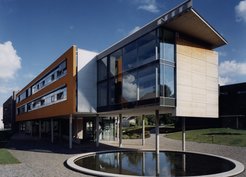
The Physics of Complex Systems is developing rapidly and is constantly changing in the course of this development. This is primarily due to the variety of subjects ranging from new and unconventional questions in traditional areas such as solid state physics or molecular physics, all the way to physical problems in biological or man-made systems (e.g. financial markets). Among this variety of topics, scientists at the Max Planck Institute for the Physics of Complex Systems are particulary interested in the fields of condensed matter, finite systems and biological physics. The insitute is focussed on theoretical research, but maintains fruitful collaborations with a large number of experimental groups. In order to successfully perform research in such a rapidly evolving field, the organization of the Institute differs greatly from most Max Planck Institutes. The concept rests on two pillars: in-house research and a program for visiting scientists. The latter not only covers individual scholarships for guest scientists at the institute, but also 20 international workshops and seminars per year.
Max Planck Institute for the Structure and Dynamics of Matter

Architectural design for the new MPSD building
(to be completed in 2019)
The Max Planck Institute for the Structure and Dynamics of Matter investigates dynamical phenomena within matter down to the elementary timescales of atomic and electronic motions, the femtosecond or attosecond timescale. The focus is on the use of short wavelength ultrafast probes, such as X-rays or electron pulses, which are capable of measuring atomic and electronic structures in matter of all kinds. The institute was founded in January 2014 and currently hosts three departments. At present, the institute is mainly active in condensed matter physics, with a focus on the study of cooperative phenomena, collective excitations and on the quantum control of complex solids, and in chemistry, with a focus on the study of the dynamics of small and large molecules as they carry out physical, chemical and biological function. The institute will expand over the next years and eventually will host up to five divisions and several research groups. The Institute is a partner in the Center for Free-Electron Laser Science (CFEL), together with DESY and the Universität Hamburg.
Max Planck Institute for the Science of Light
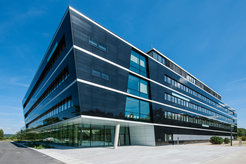
The Max Planck Institute for the Science of Light (MPL) focuses on basic research into all aspects of the interaction between light and matter, from modern optics to photonics, quantum effects and their applications in the "real" world. It aims to extend the realm of the possible in the science and technology of light. Optics in Erlangen has a long tradition both in the Natural Sciences and in engineering. Based on previous experiences the Max Planck Research Group for Optics, Information and Photonics was established from 2003 to 2008. It was operated by the Friedrich-Alexander-University and co-financed by the Max Planck Society and the Free State of Bavaria. After a successful evaluation, the Max Planck Institute for the Science of Light was founded on 1 January 2009.
Fritz Haber Insitute of the Max Planck Society
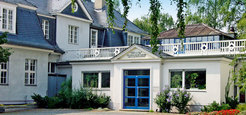
The Fritz Haber Institute of the Max Planck Society is named after the chemist Fritz Haber who explored the basic reaction of atmospheric nitrogen with hydrogen which was instrumental in the industrial production of nitrogen fertilizer. Scientists working today at the Institute still pursue similar purposes, in that they look at chemistry from a physical perspective. Their fields of research are the main characteristics of atoms, molecules and electrons, and their findings explain the behaviour of these particles in chemical reactions. They also want to understand how surface structure – of a catalyst, for example – influences chemical reactions. This information is essential for the chemical industry where more efficient catalysts are welcome.

